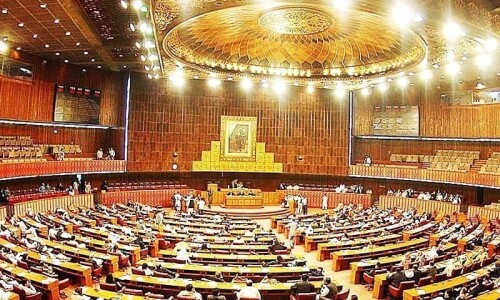 ISLAMABAD, June 30: US Assistant Secretary of State for South and Central Asian Affairs Richard Boucher has expressed concern over the deteriorating law and order situation in the Federally Administered Tribal Areas (Fata) and said that the government is not concentrating on the problem because of the judges issue and a cold war among coalition partners.
ISLAMABAD, June 30: US Assistant Secretary of State for South and Central Asian Affairs Richard Boucher has expressed concern over the deteriorating law and order situation in the Federally Administered Tribal Areas (Fata) and said that the government is not concentrating on the problem because of the judges issue and a cold war among coalition partners.
Mr Boucher, who is on a three-day visit to the country, spent a busy day in the federal capital on Monday and met Prime Minister Yousuf Raza Gilani, Chief of the Army Staff (COAS) Gen Ashfaq Parvez Kayani, Prime Minister’s Adviser on Interior Affairs Rehman Malik, former interior minister Aftab Ahmed Khan Sherpao and National Security Adviser Mahmud Ali Durrani.
He is likely to meet President Pervez Musharraf on Tuesday.
Sources said that Mr Boucher conveyed the concern of the United States over the law and order situation and an increase in militancy in the tribal areas.
The US official expressed the desire that coalition partners should be on the same wavelength on critical matters like that of deposed judges.
He was of the view that the coalition partners should bury their differences and resolve all matters, including the judges’ issue, so that the government could concentrate on controlling the situation in Fata.
The meetings also focused on matters of mutual interest and regional situation, including Afghanistan.
Inter-Services Public Relations (ISPR) Director-General Athar Abbas was reluctant to give details of the meeting between the US official and the COAS.
In his meeting with the prime minister, Mr Boucher said the US had great interest in the success of the democratic government and economic well-being of the people of Pakistan.
He said the US was ready to help resettle over two million Afghan refugees in their country. US Ambassador to Pakistan Anne Patterson and US President’s Special Assistant Mark Webber also attended the meeting.
Prime Minister Gilani said Pakistan greatly valued its relationship with the US and was keen to strengthen political, economic, defence and security ties.
“We are desirous of a broad-based and long-term relationship focussing especially on bilateral cooperation in trade, energy, investment, science and technology, educational and cultural fields with a view to bringing the people of the two countries closer to each other,” he said.
He said he had no doubt that the victory of democratic and progressive forces in Pakistan, especially in the NWFP and Balochistan, and the formation of broad-based democratic governments at the centre and in the provinces would cement the close and cooperative relationship between the two countries.
He said terrorism was a global phenomenon and a serious threat to humanity, which was ruining global peace and economic development.
“One incident of terrorism in Pakistan leads to flight of foreign capital from the country besides discouraging foreign investment. Former prime minister Benazir Bhutto also became a victim of terrorism,” he said.
The prime minister said Pakistan was fighting terrorism and extremism in its own national interest and not to serve the objectives of any other country.
Mr Gilani told the US official that the government in consultation with the coalition partners had adopted a three-pronged strategy to deal with terrorism by initiating political dialogue with elements who had laid down arms and joined mainstream political activities, accelerating the pace of economic development and reserving the right to use force if agreements were violated.
“We will, however, never negotiate with militants nor allow foreigners to use our soil against another country,” he said.
The prime minister said the government had received a lot of public support for the action being taken against militants in the tribal areas over the past couple of days. “Pakistan is keen to see a stable and strong Afghanistan in its neighbourhood, which is equally good for both Afghanistan and Pakistan,” he said.
The government, he said, was making strenuous efforts to strengthen security along the Afghan border, including the installation of biometric system on entry points.
He said Pakistan had also offered to fence the border.
He emphasised the need for better monitoring of the border from the Afghan side. He said Pakistan had 900 checkposts compared to about 100 such posts on the Afghan side, which were inadequate.
The prime minister said Pakistan needed increased economic assistance not only to stabilise democracy but also to fulfill promises of providing a better life to the people.
“Pakistan needs the help all the more urgently in view of the steep rise in the global prices of oil and food commodities,” he said.
He stressed the need for early setting up of the Reconstruction Opportunity Zones to stimulate economic activities in the designated areas of the NWFP and Balochistan and provide assured access to the US market for goods produced in the tribal areas. The prime minister said he looked forward to meeting President George W. Bush in Washington towards the end of next month.
APP adds: Talking to a US Congressional delegation, Prime Minister Gilani said Pakistan needed help of the United States to rebuild its economy.
The members of the delegation affirmed readiness of the US to support Pakistan in its efforts to address security issues and to achieve economic progress over the long term.















































Dear visitor, the comments section is undergoing an overhaul and will return soon.